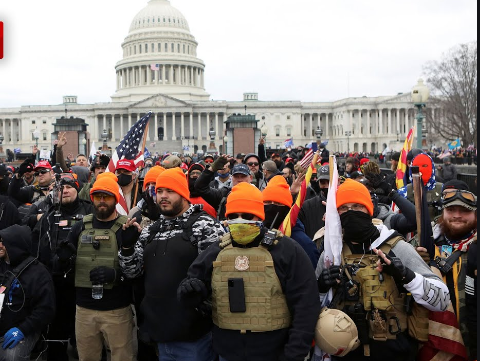Photos: YouTube
Today, the Southern Poverty Law Center (SPLC) released a new analysis The Year in Anti-government Extremism detailing the activities and dangers of the 566 extreme anti government groups that were active in 2020.
The anti government analysis is the second in a three-part series of SPLC’s flagship Year in Hate report — the first section of which was released last week.
Anti government groups pose a unique threat to our nation. They spread unfounded claims and conspiracy theories that downplayed the severity of the COVID-19 pandemic, categorized Black Lives Matter supporters as terrorists, and questioned the legitimacy of our election. They participated in armed protests and called for violence, even plotting to kidnap the governor of Michigan. And most recently, they led a brutal, bloody insurrection on the U.S. Capitol that left multiple people dead.
“The anti government threat is likely to grow even worse in the months ahead, with the real possibility of new acts of domestic terrorism in response to Donald Trump’s impeachment trial, new health and safety measures to combat COVID-19, and more,” said Margaret Huang, President and CEO of SPLC.
Among SPLC’s findings about the anti-government groups:
- In 2020, California had the highest number of active anti-government groups (51), followed by Ohio (31), and Texas (29).
- Some anti-government groups initially expressed cautious support for protests against police brutality. For example, the militia organization Virginia Knights originally defended the rights of protesters to rally for justice. However, then-President Trump’s constant denigration of the BLM movement, and his use of force against it, helped shift the anti-government movement’s posture toward BLM from one of uneasy support to open antagonism.
- Anti-government groups capitalized on the narrative that BLM protestors were domestic terrorists to justify vigilantism, a role right-wing militias have historically embraced in their attempts to circumvent the law.
- There were at least 50 instances where far-right-wing extremists showed up to BLM rallies during the summer.
- Paramilitary groups also increased their activity in response to the COVID-19 restrictions and the disputed 2020 elections.
- In addition to opposing the government from the outside, some prominent extremists are attempting to run for public office. For example, several leaders from Ammon Bundy’s new People’s Rights network — which wants governmental power to be used to protect the “righteous” against liberals, Antifa, Black Lives Matter activists, and others — are running for office in an attempt to “become” the government. Members of the Oath Keepers, a far-right militia organization, also appear to be using this strategy at the local level.
Self-proclaimed “constitutional sheriffs,” who believe sheriffs are the highest law enforcement authority in the country and have the ability to use their elected positions to defy federal laws they deem unconstitutional, supported anti-government groups by defying COVID-19 lock-downs and spreading lies about the 2020 election.
“Anti-government groups fundamentally distrust the government and fuel lies and conspiracy theories that undermine its credibility. These groups are often quick to resort to vigilantism when they believe the government is incapable of correcting a perceived injustice,” said Susan Corke, director of SPLC’s Intelligence Project.
The third and final section of SPLC’s Year in Hate report, which explores how extremists benefit from Big Tech and political violence in the white power movement, will be released on February 16, 2021. SPLC is a catalyst for racial justice in the South and beyond, working in partnership with communities to dismantle white supremacy, strengthen intersectional movements, and advance the human rights of all people.







